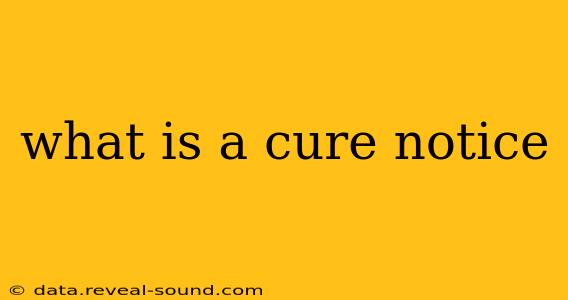A cure notice is a formal notification sent by a landlord or property owner to a tenant, informing them of a breach of their lease agreement and providing them with a specific timeframe to rectify the violation. This notice doesn't automatically evict the tenant; it gives them an opportunity to "cure" or fix the problem before facing more serious consequences, such as eviction. Think of it as a final warning before legal action might be taken.
The specific requirements for a cure notice vary significantly depending on local and state laws. It's crucial to understand your jurisdiction's regulations regarding lease agreements and eviction procedures. This article will explore the key aspects of cure notices, but it's not a substitute for legal advice. Always consult with a legal professional for guidance related to your specific situation.
What types of lease violations typically trigger a cure notice?
Several lease violations could result in a landlord issuing a cure notice. These commonly include:
- Late Rent: This is perhaps the most frequent reason for a cure notice. Consistent late payments can lead to a formal notice demanding payment within a specific period, often accompanied by late fees.
- Damage to Property: Significant damage beyond normal wear and tear, such as holes in the walls, broken appliances (due to tenant negligence), or property damage resulting from parties or unauthorized occupants, could necessitate a cure notice. The tenant would be expected to repair or pay for the repairs.
- Lease Violations: Violations such as unauthorized pets, subletting without permission, or exceeding the allowed number of occupants can all trigger a cure notice.
- Non-Compliance with Rules and Regulations: Community rules regarding noise levels, parking, garbage disposal, or other stipulated regulations can be grounds for a cure notice if repeatedly violated.
What information is typically included in a cure notice?
A well-drafted cure notice should clearly state the following:
- Specific Lease Violation: Clearly identify the exact breach of the lease agreement. Vague language is unhelpful and could weaken the landlord's legal standing.
- Timeframe to Cure: Specify the exact deadline by which the tenant must remedy the violation. This deadline must comply with local and state laws.
- Consequences of Non-Compliance: Clearly outline the consequences of failing to rectify the problem within the given timeframe. This usually involves the initiation of eviction proceedings.
- Contact Information: Provide contact details for the landlord or property manager so the tenant can seek clarification or discuss options.
How long do I have to cure the violation?
The timeframe for curing a violation is dictated by state and local laws. This period can range from a few days to several weeks. It's absolutely vital to check your lease agreement and local laws to understand the specific timeframe applicable to your situation. Missing the deadline can severely impact your chances of avoiding eviction.
What happens if I fail to cure the violation?
Failure to cure the violation within the stipulated timeframe typically results in the landlord initiating eviction proceedings. This process involves legal action, potentially leading to court appearances, and could result in an eviction judgment. This can severely damage your credit score and make it difficult to secure future housing.
Can I negotiate with my landlord after receiving a cure notice?
While a cure notice is a serious matter, it's often possible to negotiate with your landlord. If you're facing financial hardship or other challenges, try to communicate openly and honestly. Proposing a payment plan or outlining a timeframe for repairs might help avoid escalation. However, always ensure you're fulfilling your legal obligations, and remember that any agreement should be in writing.
Where can I find more information about cure notices in my area?
Your local tenant rights organization or a legal aid society is an excellent resource for information specific to your region. These organizations can provide guidance and potentially legal assistance. You can also find relevant information online by searching for your state's tenant-landlord laws.
This information is for general knowledge and should not be considered legal advice. Always consult with a legal professional if you have questions or concerns regarding a cure notice or any aspect of your lease agreement. Understanding your rights and responsibilities as a tenant is crucial to protecting yourself.
